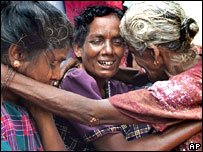Fear Grips Sri Lankan Tamils As Civilians Killings Rise
 Reuters
ReutersMay 16, 2006
ALLAIPADDY, Sri Lanka - Plagued by the sight of the bloodied corpses of 12 relatives gunned down in this quiet Sri Lankan fishing village, ethnic Tamil Niroshani Konsaru is too afraid to go home.
Huddled with hundreds of fellow villagers at their local church on Sri Lanka's northern tip after a weekend attack by unidentified gunmen, Konsaru yearns to flee her quiet islet and head far away from growing signs of a resumed civil war.
"I heard gunfire for at least 15 minutes. I heard people shouting and crying," the unemployed 20-year-old said as she and her neighbors clutched what belongings they could carry with them; sleeping mats, clothes, children's toys, cooking pots.
"All the villagers ran to church. We saw several shops burning. The next morning we found 12 dead bodies. All are my relations," she added.
Tamil Tiger rebels posted stomach-churning pictures of the dead -- which include a four-month-old baby and four-year-old child -- on their official website www.ltteps.org. The rebels blamed the attack on navy soldiers posted nearby.
The government blames the Tigers, but villagers here blame a former Tamil paramilitary group allied to the government.
"Our villagers are not blaming the Tigers or government military forces. They are not responsible for this incident," Konsaru said. "We believe EPDP (Eelam Peoples' Democractic Party) did this work. All the villagers are scared."
"We want to go to the Wanni," she said, referring to nearby dense jungle controlled by the Tigers. "There is no protection here."
The EPDP, a former paramilitary group which now has a minister in the cabinet and has long had a strong presence in the area, called the claim "total fabrication."
READY TO LEAVE
Many residents in the northern army-held Jaffna peninsula, 450,000 of whom fled their homes in 1995 during the island's two-decade civil war, are packing their bags ready to leave if clashes between the military and the rebels intensify.
With more than 270 deaths since early April, and the worst military confrontation last week since a 2002 truce, the violence looks just like periods of the civil war in which over 64,000 people died.
On Thursday the Tigers' sea wing attacked naval fast attack boats off the island's north coast, sinking one and killing 18 people aboard.
The government responded with aerial bombings around the Tigers' northern stronghold of Kilinochchi. But aid workers say there is not yet any sign of new widespread displacement.
"We've had no confirmed displacement as a result of recent military clashes between the government and the Tamil Tigers," said Lyndon Jeffels, spokesman for the United Nations' refugee agency UNHCR.
In and around Jaffna, residents are tense. Most shops are shut on the orders of suspected Tiger front organizations, banks only open an hour a day, and soldiers patrol the streets with their fingers curled around triggers.
Grenade attacks, bombings and shootings now occur near daily. Nordic truce monitors say they suspect some troops have been involved in extrajudicial killings of Tamil civilians.
Many residents are too scared to venture out, but some are sick of the to-and-fro of Sri Lanka's protracted conflict, and are vowing to stay put even if all-out war resumes.
"I can't pay salaries for my workers because banks work for only one hour. Jaffna life is very difficult," said Koneshvara Murthi, a retired policeman who runs a driving school in Jaffna.
"There are too many military checkpoints. Normal civilian life is very difficult. We need peace, but politicians need war," he added. "I want to stay on my own land. But our life is very dangerous."

0 Comments:
Post a Comment
<< Home